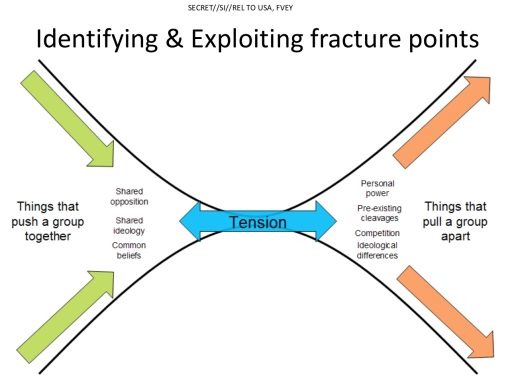(note: I have continued my research into this topic and published two other articles on the subject, which you can find here and here. The second is the most complete. Also, this post was updated 1-15-16.)
I recently read one of Glenn Greenwald’s articles on Edward Snowden’s leaks. The story was called “How Covert Agents Infiltrate the Internet to Manipulate, Deceive, and Destroy Reputations.” When I saw the diagram above, from a classified power point presentation created by NSA’s Joint Threat Research Intelligence Group, or JTRIG, I immediately thought of my old home, The Farm (an intentional community), because that diagram, to me, illustrated the dynamics that brought us together, and the dynamics that pulled us apart. But this power point presentation wasn’t just about the natural history of groups. It was about how to manipulate a group in order to destroy it. The “Old Farm” existed in the days before the internet, but the tactics JTRIG recommended would work for any organization, not just virtual ones.
In the article, Greenwald said
Critically, the “targets” for this deceit and reputation-destruction extend far beyond the customary roster of normal spycraft: hostile nations and their leaders, military agencies, and intelligence services. In fact, the discussion of many of these techniques occurs in the context of using them in lieu of “traditional law enforcement” against people suspected (but not charged or convicted) of ordinary crimes or, more broadly still, “hacktivism”, meaning those who use online protest activity for political ends.
The title page of one of these documents reflects the agency’s own awareness that it is “pushing the boundaries” by using “cyber offensive” techniques against people who have nothing to do with terrorism or national security threats,….
….Whatever else is true, no government should be able to engage in these tactics: what justification is there for having government agencies target people – who have been charged with no crime – for reputation-destruction, infiltrate online political communities, and develop techniques for manipulating online discourse? But to allow those actions with no public knowledge or accountability is particularly unjustifiable.
Discovering that this strategy was encoded in the NSA’s playbook reminded me of a time, thirty years ago, when I first intuited that there might have been more to the Old Farm’s demise than met the eye. (“The Old Farm” is a term used by current and former residents of the community to refer to its earlier, communal phase.) Read the rest of this entry »

recent comments